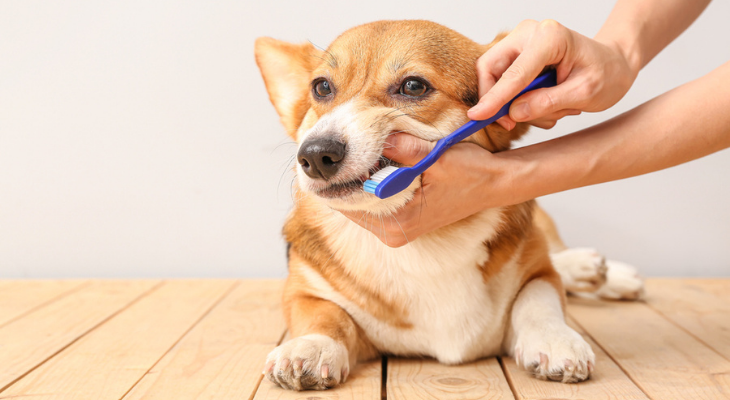
Pet Oral Health Myths and Facts for Pet Dental Health Month
National Pet Dental Health Month, observed every February, is the perfect time to focus on your pet's dental needs. Unfortunately, tooth and gum issues aren't always easy to spot but can cause pain and health problems for pets. Can you separate myth from fact when it comes to your furry friend's oral health?
Myth or Fact: Pets Need to Brush Their Teeth
Fact. Brushing helps your pet's teeth remain strong and healthy. Regular brushing sessions remove plaque, a clear, sticky film that contains bacteria. Plaque can be a factor in infections, abscesses, gum disease, and bad breath. If plaque isn't removed, it soon becomes a hard deposit called tartar. Tartar irritates the gums, increasing your pet's gum disease risk. The deposit usually forms at the base of teeth first and makes your dog or cat's teeth look brown or yellow.
Brushing your pet's teeth gets rid of plaque and stops it from ever becoming tartar. The American Veterinary Medical Association recommends brushing your pet's teeth at least several times per week, although daily brushing is best.
You only need to use a small amount of pet-approved toothpaste when cleaning your pet's teeth with a pet toothbrush or a finger brush. Although it may be tempting to squirt your toothpaste on your pet's brush, sharing isn't a good idea. Pets won't like the taste and may become ill or develop an upset stomach. Luckily, you'll find plenty of safe choices at your favorite pet supply store.
Have you tried brushing your pet's teeth in the past and given up because it was just too difficult? Try introducing brushing gradually. Start by rubbing a moist cloth over a few teeth. When your pet can tolerate this type of cleaning, move on to brushing with a pet toothbrush and toothpaste. Patience is important. It may take weeks or months until you can brush all of your pet's teeth at the same time. In the meantime, dental chews and other products can be helpful in removing plaque.
Myth or Fact: Your Pet Doesn't Need Dental Checkups
Myth. Checkups are just as important for your pet as they are for you. Most dogs and cats have signs of dental disease by the time they're three, according to the American Animal Hospital Association. Unfortunately, animals usually don't show pain or signs of illness until a dental problem is severe. If your pet's veterinarian doesn't examine your furry friend's mouth once a year, you may not realize that every bite is painful due to an infected tooth or that a broken tooth makes chewing difficult. Even though your pet seems fine, a hidden dental issue could be causing problems.
During yearly dental exams, your pet's veterinarian looks for broken teeth, tumors, and signs of infection, gum disease, and other oral health issues. Treating dental issues promptly protects your pet's oral and overall health.
Myth or Fact: Anesthesia Is Unnecessary for Dental Cleanings
Myth. A dental cleaning is an important part of your pet's annual dental exam. The cleaning gets rid of plaque and tartar above and below the gum line. Once tartar builds up below the gums, your pet may be more likely to develop bone and jaw infections or gum disease. If untreated, these conditions can cause tooth loss.
Cleanings offer a simple way to remove plaque and tartar, but they're difficult to perform when patients aren't cooperative. Struggling pets and sharp dental instruments are a bad combination. When your pet is anesthetized, accidental injuries aren't a problem. Anesthetizing your pet also makes it easier to obtain clear X-rays.
Your pet's safety is the priority during cleanings. In addition to monitoring your pet's vital signs during the cleaning, blood tests will be performed prior to the appointment to ensure that your pet is healthy enough for anesthesia.
Myth or Fact: Teeth and Gum Issues Could Affect Your Pet's Health
Fact. Infections in your pet's teeth and gums could spread to other parts of the body if bacteria enter the bloodstream. In fact, dental disease increases your pet's risk of heart, kidney, and liver disease. Poor dental health could also trigger inflammation throughout your pet's body. Chronic inflammation may increase the risk of diabetes, obesity, arthritis, and cancer.
Is it time for your pet's dental checkup? Get in touch with our office to schedule an appointment.
Sources:
February National Pet Dental Health Month
Tufts Now: Chew on This, 8/15/11
Animal Wellness: Chronic Inflammation and Your Pet - Part 1, 10/20/17

